The History of Duels
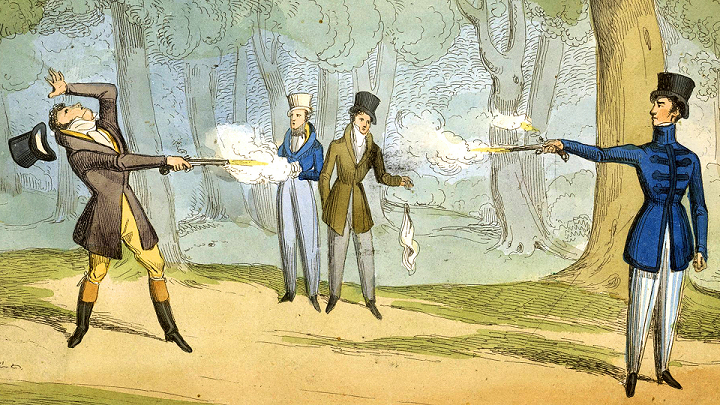
image source
The Duel and Duelling (Latin duellum, from duo, two) was an arranged combat between two persons to avenge an insult, a reflection upon one’s honour, especially amongst men of noble birth and the military classes, 'the duelling classes'
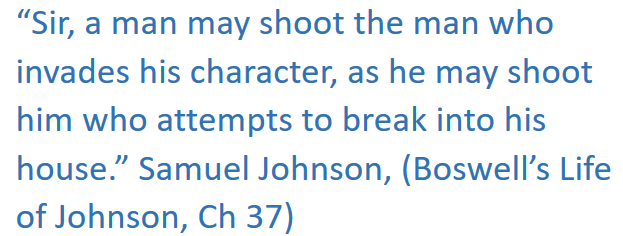

The idea of a duel at 12 paces with pistols drawn may seem somewhat primitive by today's standards, but a gentleman's untarnished honour and reputation were essential to his social position and advancement. The duel appears to derive from prehistoric times. In ancient combat a representative would be chosen from respective armies to fight to the death as a fixer, or to divine which army had the favour of the gods. The battle in the Valley of Elah between David and Goliath image source, or the clashes of Achilles against Ajax and Hector in the Iliad of Homer are examples from the ancient sources that would influence the duels between classically educated gentlemen of one century ago.
The custom spread over medieval north-western Europe and in 516 the Burgundian king, Gundobald, legalised the judicial duel, which saw chivalrous knights squaring-off on horseback in jousting tournaments with longswords and polearms to settle private quarrels in defense of their honour. The spectators would assume that the vanquished were the guilty party. As combat on the battlefields of Europe shifted-away from heavy armaments towards lighter weaponry and firearms, this was to be an intermediary step in the evolution towards the late 19th century forms of the duel.
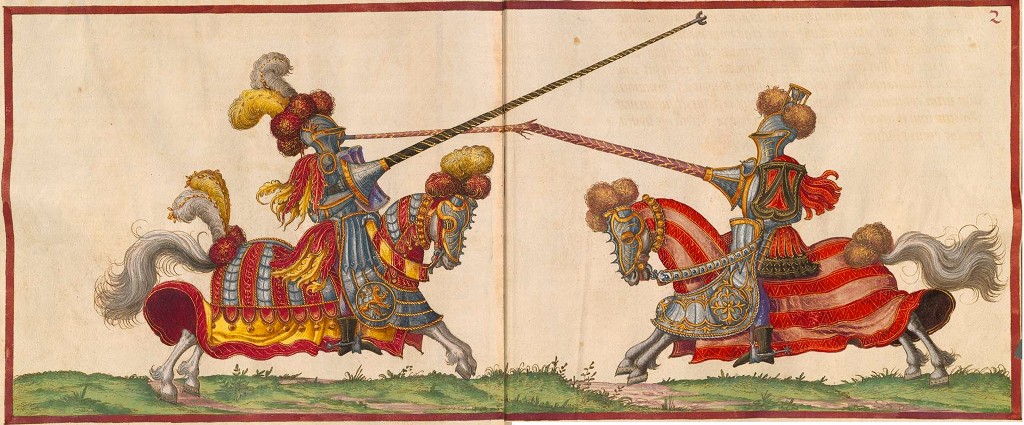
Although duelling was condemned by Pope Nicholas I (858-67) and by many succeeding Popes, it became widely practiced in France, especially from the time of Francis I, developing to such an extent that, in 1626, Cardinal Rochelieu confiscated the property of duellists and banished them from France, because so many members of the gentry had been killed. However, the practice still continued as a means of settling matters of private dispute for which the law provided no remedy, or such as was not deemed satisfactory and in Britain duelling became fashionable during the Restoration. The fatal duel between Lord Mohun and the Duke of Hamilton is familiar from Thackeray's Henry Esmond.
In America, the first recorded duel took place between Edward Doty and Edward Lesterat at Plymouth Rock, in 1621. Both men were equipped with swords and the encounter resulted in minor wounds rather than a fatality. The prevalence of duels there increased sharply, especially in the Northern and Southern States between candidates for political office, lawyers, doctors, newspaper editors, jostling for position and status within American society.
The Chivalric code of honour practiced by jousting knights had much to do with the formation of early duelling codes, but despite many similarities, the code often varied depending on the era and location, until a process of standardization occurred with the publication of The Dueling Handbook by Joseph Hamilton (1829) and The Code of Honor by John Lyde Wilson (1838).
As a rule, a gentleman could not refuse an invitation to duel without loss of face and honour. The only honourable means of rejecting a duel was to question whether the challenger was someone who was considered to be a true gentleman, but a refusal could result in someone being denounced in a newspaper as a dishonourable coward and he was then destined to eat his chop alone at the club, assuming they'd still have him.
The Person aggrieved was the challenger and the preliminaries and all arrangements of the combat were settled by the 'seconds', the supporters of each party, which included responsibilities for locating a suitable duelling ground, usually somewhere remote to prevent a large crowd assembling, but as arrangements for such were conducted in a calm and dignified manner, letters would also be exchanged in the meantime between 'seconds' demanding that the other party apologize and, should no apology be forthcoming, preparations for the duel would commence. The choice of weapons and time of combat were the prerogative of the challenged party.
A lovely pair of 19th century French Duelling Pistols in a velvet lined mahogany case, image source
Upholding one's honour and reputation was not only won by showing up for a duel, but a gentleman had to convey a lack of fear and calmness on the duelling ground and should he step off his mark, the protocols gave his opponent’s second the right to shoot him on the spot.
In defense of the custom, some contend that duelling played a part in the development of civility and politeness, more particularly in the upper-classes, its mark left in the raising of the hat, bowing, toasting, honourable mentions and intentions, obsequious language, all intended to avoid giving offence, or perceived insults and slights and the resulting invitation to duel. Feuds had to be avoided, jealousies and resentments repressed by an outward show of good terms and friendly relations. Others would say that the bloodshed was barbaric, challenges could be made all too easily by the over-sensitive and, just as in 17th century France, the number of fatalities was too high, families were left bereft of the breadwinner.
By the end of the 19th century, duels had ceased to be fought to the death and by the outbreak of the Civil War in America and World War I in Europe the practice had been largely outlawed throughout the western world and military establishments naturally wanted to avoid the needless loss of life within its ranks. The rise of the print-media in the 19th century and the judicial sphere also provided the opportunity to maintain one's reputation and resolve conflicts by written correspondence inside the newspapers, or by bringing a charge of defamation or libel for damages, which transformed the courtroom into the new duelling ground. The last recorded duel in America was fought on 13th September 1859 between US Senator for California, David C. Broderick and ex-Chief Justice of the Supreme Court of California, David S. Terry, Broderick being fatally wounded and public outrage lead to the formation of legislation against the custom. The last fatal duel in England took place on 19th October 1852. In the eyes of the law, a challenge to a duel is a breach of the peace, a fatal result is a homocide, whether murder or manslaughter and the seconds are accessories.


An illustration depicting the duel between Burr and Hamilton, in 1804 image source
Aaron Burr was the serving vice president under Thomas Jefferson and challenged the former Secretary of the Treasury, Alexander Hamilton, to an affair of honour after their long and bitter personal animosity and political rivalry, dating back to 1791, culminated in Hamilton's defamation of Burr in the press during Burr's gubernatorial campaign race of 1804, in New York, which Burr subsequently lost. Hamilton had considered Burr to be corrupt and something of a political opportunist, ever since Burr had defeated Hamilton's father-in-law to a seat in the US Senate in 1791 and he had vehemently campaigned to ruin Burr's subsequent political career, especially since Burr had played a leading role in Jefferson being named president with him serving as vice president. Hamilton deeply resented the idea that Burr could one day be named president himself. The duelling ground selected was near Weehawken, in New Jersey. Some accounts say that Hamilton had only ever intended to fire a symbolic shot up in the air and to resolve the acrimonious affair afterwards. Hamilton's shot missed Burr and Hamilton was shot in the stomach, dying later that afternoon, but the court of public opinion reacted against Burr, who was charged with murder, his career in public life over.

A satirical cartoon of the Pitt vs Tierney duel by James Gillray image source
The normally so cerebral Pitt the Younger accepted a written challenge to a duel from George Tierney, a member of the opposition in the House of Commons and this came at the height of Britain's war with revolutionary France, while Pitt was Prime Minister. Tierney was Treasurer of the Navy and had objected to a bill to increase naval power and asked for more time to consider it, but Pitt stated that Tierney's actions could be interpreted as the opposition playing party politics and attempting to "obstruct the defence of the country", an accusation that Tierney felt was a slight on his personal courage. Pitt had been asked to retract his remark, but refused to do so. Pitt accepted the duel immediately and made-out his will. Pitt received much criticism for irresponsibly engaging in a duel at such a critical time in the nation's history, but on the duelling ground, at Wimbledon Common, both men saw sense and deliberately fired away.

An eyewitness account of Mr Pitt's duel from the Farington Diary source

At dawn on 23rd March 1829, Battersea Fields, in South London, would be the selected venue for another duel involving a British Prime Minister, the Duke of Wellington, national hero of the Battle of Waterloo and his opposite number the Earl of Winchelsea, after the Duke's government had passed the Catholic Relief Bill, which would allow Catholics to take seats in the House of Commons. The Earl of Winchelsea was a staunch Protestant and published a correspondence later in the Standard Newspaper accusing Wellington of introducing Popery into Parliament and departments of the state. Letters were exchanged to hammer-out the issue, but no apology was forthcoming and a duel became inevitable. According to the Morning Herald, the two lords dueled at dawn, amongst the cabbages at Battersea Fields. It was to be a bloodless affair, as both men went through the formalities of deliberately discharging their pistols to no effect, after which the Earl retracted the accusations of his newspaper letter and Wellington was satisfied that the matter was concluded. image source

A report on the duel from the Sussex Advertiser image

Your opinion is celebrated and welcomed, not banned or censored!

